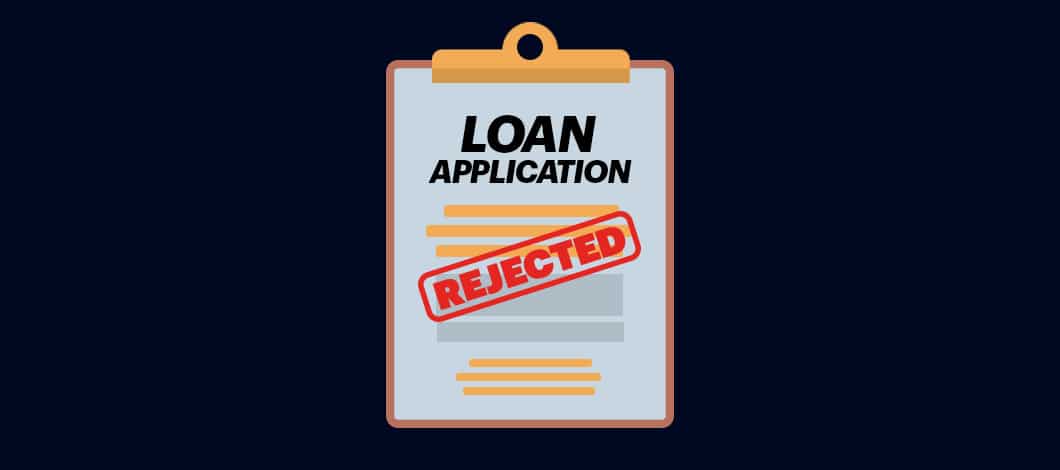If you’re like the 35% of firms that were denied the financing they were seeking, you might be wondering why. Learn what lenders are looking for in terms of applicant criteria and the common reasons for business loan denials.
Also keep in mind, a loan application denied is likely a temporary problem you can overcome. Indeed, a disapproved loan usually isn’t a permanent no, which means you can try again later.
Ultimately, preparation can be key. When you learn more about lender underwriting requirements, you can prevent business loan denials (or work to turn denials into approvals).
Why Was My Business Loan Denied?
Here are 10 common reasons for a disapproved loan:
- Bankruptcy
- Tax liens and judgments
- Credit history and score
- Industry risk
- Insufficient operating history
- Cash flow
- Missing or incomplete information
- Too much debt
- Business structural concerns
- Insufficient collateral
Let’s break each down:
1. Bankruptcy
Having a history of personal or business bankruptcy is often a reason to have a business loan denied by a lender. Additionally, if the business or any business owner of the company is currently in bankruptcy, this is usually an automatic reason for a disapproved loan.
However, some lenders might approve a financing application if the bankruptcy protection has been filed and completed, also referred to as discharged. Even so, while it is possible to get a business loan after bankruptcy, it can be very challenging.
2. Tax Liens and Judgments
A business loan application may be denied if the company has unpaid tax liens or outstanding judgments. However, some lenders of bad credit business loans work with business owners who have outstanding liens or judgments as long as there is a payment plan in progress to pay off the debts. The plan must be agreed to by all parties and the payments must be current.
3. Credit History and Score
If you’re applying for a business loan, your personal credit and business credit history are considerations for many lenders. Having an excellent business credit history and a high personal FICO credit score are very helpful when qualifying for a business loan.
Even with a good credit rating, however, you could find your business loan is denied if you don’t meet the lender’s other qualifications and requirements.
4. Industry Risk
If a lender rejects a loan application, this may be because of unacceptable loan purposes, such as use of funds in a restricted industry category.
Examples of businesses that may find it more difficult to get a loan and may have a loan application denied include:
- Cash businesses, such as privately owned automated teller machines
- Money exchange and transfer services
- Cannabis, alcohol, pornography or gambling businesses
- Off-shore businesses
- Online businesses with significant credit card charge-backs
5. Insufficient Operating History
A lack of sufficient operating history could also cause a business loan to be denied. As a result, it’s best to check loan eligibility before applying to see if the lending requirements include a minimum time in business. If this is the case, all you have to do is wait for that amount of time to pass, and then you can re-apply.
6. Cash Flow
In a similar vein, most lenders have a minimum monthly or annual cash flow requirement that interested borrowers must meet in order to be considered for a business loan. If you check loan eligibility before applying, you’ll find that the lenders are usually quite explicit about these requirements.
Businesses that are startups, and others that are seasonal, have more challenges getting a business loan because of the cash flow requirements.
7. Missing or Incomplete Information
When applying for a business loan, be sure to fill out the application completely and accurately. If a lender asks for supporting documents, give the lender copies of exactly what is requested – no more, no less.
8. Too Much Debt
If a business already has considerable debt, lenders are reluctant to lend the business more money. One way to avoid this problem is to pay down debts. You could ask for a consolidation loan where you could use some of the loan proceeds to do just that. This strategy is effective if the new loan is large enough and provided at a lower interest rate than the existing debt obligations.
9. Business Structural Concerns
Other reasons to deny a business loan include company size, insufficient management team, customer concentrations, insufficient personal guarantees, weakening industry sector and general economic conditions.
10. Insufficient Collateral
Banks often require significant collateral for secured business loans. Additionally, for Small Business Administration (SBA) loans, lenders usually look to secure assets with a value up to the amount to be financed. If the funding you’re seeking requires collateral and you don’t have enough to offer, a lender may deny you for a business loan.
Related: Why Was Your SBA Loan Denied?
Frequently Asked Questions When a Business Loan Is Denied
If a lender rejects your loan application, you’ll probably have a lot of questions. Here are a few common ones we hear from borrowers and advice for each.
My Loan Was Declined. When Can I Apply Again?
Once you find out why your loan was denied, you’ll have a better idea of when you can (and should) apply again. For some borrowers, a change could be evident in a few months, while for others, it could take a year or longer.
For instance, if the issue is a low credit score, you can start monitoring your credit through credit reporting systems to keep an eye on when your score increases. Conversely, if the issue is cash flow, you should wait until a time when you’re generating more revenue and have lowered your business expenses.
What Can I Do If I Am Refused a Loan From My Bank?
If you’re refused a loan from your bank, which is not uncommon for many small business owners, consider alternative financing. Nonbank business loans typically have less stringent requirements than conventional business funding.
If you’ve been denied a bank loan or an SBA loan, consider a short-term loan or a merchant cash advance. You might be surprised to find you could be approved for these types of financing, even if you have a credit score in the 500s.
Should I Take a Loan Approval That Is Less Than I Want?
Sometimes lenders won’t approve you for the full loan amount you seek but will approve you for a partial amount. For example, according to the Federal Reserve Banks’ Small Business Credit Survey, 34% of small businesses received only a partial approval for the financing they were seeking.
At that point, it can be difficult to know whether you should take an offer or not. If that’s the case, the most important thing you can do when determining if a loan makes sense is to calculate the return on investment you’ll see from the approval amount and terms.
See if you’re eligible for business financing (even if you’ve been denied before).
How to Get a Loan When You Keep Getting Denied
Did you know 22% of companies surveyed by the Federal Reserve Banks didn’t apply for financing because they were discouraged after having been refused a loan in the past?
However, as the saying goes, if at first you don’t succeed, try, try again. If your business loan application is denied, be sure to ask for more details and find out what you can do to improve your situation.
Depending on the reasons why you were disapproved for a loan, you can take steps such as the following to improve your standing in the eyes of lenders and seek a yes instead of a no:
- Strengthen your business credentials (e.g., revenue, time in business)
- Repair credit history and scoring
- Be patient and reapply down the road












